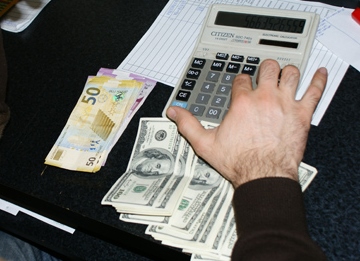
Devaluation of National Currency Threatens Regime Stability in Azerbaijan
Publication: Eurasia Daily Monitor Volume: 12 Issue: 39
By:

On February 21, the Central Bank of Azerbaijan (CBA) devalued the country’s currency, the manta, by 33.5 percent against the US dollar, and 30 percent against the euro. On the day of the devaluation, the national currency was rated at 1.05 manat to the dollar, in contrast to the previous official rate of 0.78 to 1. According to the Azerbaijani Central Bank, the decision to devalue the manat was made in order to boost the development of the country’s economy, increase its international competitiveness and to improve its export potential. The CBA announced that the “correction” to the manat’s official rate was necessary due to widespread devaluations of national currencies, associated with the downward trend in global oil prices, of Azerbaijan’s neighbors and trade partners across the post-Soviet space (Novosti.az, February 23).
Despite the CBA’s announcement that commercial banks would remain open over the weekend of Saturday, February 21, and Sunday, February 22, the majority of exchange offices and banks across the capital of Baku remained closed. As reported by Azerbaijan’s consumers’ union, by February 23, a number of private banks blocked their clients’ credit cards and stopped sales on purchases of foreign currencies. Moreover, numerous retail outlets were shut down throughout Baku (Kavkazsky Uzel, February 22).
The government assured citizens that any resulting increases in prices on consumer goods would remain under control. But it was reported that private owners of grocery stores and small supermarkets went ahead and increased the prices on all their food items by nearly one-third (Trend.az, February 22). Following widespread panic among the population and the appearance of long lines at supermarkets, travelers also observed a rapid increase in prices on air tickets to Azerbaijanis’ most popular destinations (Istanbul and Moscow) (Kavkazsky Uzel, February 22). Yet, one week after the devaluation, the government has managed to control the inflation on the cost of bread and other basic food items, which continued to sell at pre-inflation price levels.
Although one of the major oil producers in the region, Azerbaijan, imports a significant amount of petroleum for the domestic market. And since the imported petroleum is purchased in dollars, the national currency devaluation is expected to result in a notable increase on fuel prices in the South Caucasus republic.
Since late 2014, experts widely anticipated that the serious drop in global oil prices throughout the past year—combined with Western sanctions on Russia, which have already significantly devastated this large neighboring country’s economy—would eventually have a negative effect on Azerbaijan (Trend.az, December 16, 2014). The government’s series of currency interventions during December 2014–January 2015, aimed at preserving the stability of the manat’s rate against the dollar and the euro—despite the reduction in global oil prices—required the authorities to spend approximately 15 percent of the country’s foreign currency reserves. And these efforts have significantly undermined Azerbaijan’s budgetary outlook.
Over the past year, many in Baku feared what impact Western sanctions on Russia might have domestically; however, these worries were constantly downplayed by the Azerbaijani government. Indeed, Russia’s recent interest in importing Azerbaijan’s agricultural products and equipment for oil facilities, which can no longer be imported from the West, resulted in the Azerbaijani government’s optimism about opportunities to diversify the country’s heavily oil-dependent economy. Nevertheless, the global fall in oil prices, along with the dramatic devaluation of the ruble and the associated recession within the Russian economy, has put on hold a number of joint projects agreed between Azerbaijan’s State Oil Company (SOCAR) and Russia’s Rosneft in 2013 (Newsazerbaijan.ru, November 27, 2014). Moreover, Russia’s demand for Azerbaijan’s agricultural exports has resulted in a steady increase to prices of locally grown fruits and vegetables on the domestic market, thus providing a boost to the already-flourishing informal economy.
The national currency devaluation has already caused an outcry of discontent from both Azerbaijani opposition parties and independent experts, who claim that the government’s move is potentially detrimental to consumers and small businesses. For example, rallies to protest the devaluation were held in the southern Azerbaijani region of Lenkoran. A smaller demonstration protesting rising inflation was dispersed by the police in downtown Baku, on February 28 (Kavkazsky Uzel, February 28). Moreover, it should be noted that the current fall in the manat’s official rate follows on the heels of the introduction of new taxes on investment deposits and land ownership (Echo.az, January 10), as well as increases in the prices of tobacco and alcohol since January 2015. Inflation on food is reportedly projected to reach 20–25 percent by the end of the year (Kavkazsky Uzel, February 22), which is likely to negatively affect broad segments of Azerbaijan’s population.
Years of high levels of economic growth and an unshakable stability of the national currency has, until now, helped to support the credibility of President Ilham Aliyev’s government in the eyes of the Azerbaijani public. However, as the country’s economy and financial system begins to suffer an acute reversal, the Aliyev government will likely find itself under growing popular pressure. For now, it appears that the government is increasingly curtailing dissent (RFE/RL, February 23), but such reactions will not resolve Azerbaijan’s underlying economic problems.




